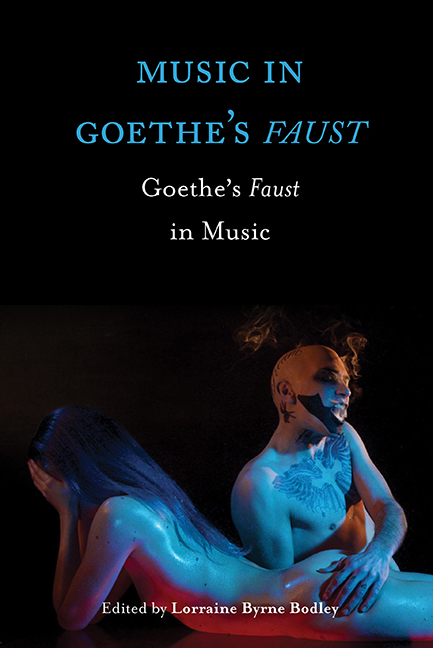Book contents
- Frontmatter
- Dedication
- Contents
- List of Illustrations
- Contributors
- Acknowledgements
- Abbreviations Used in the Notes
- Introduction. Rhapsody and Rebuke: Goethe's Faust in Music
- Part I Goethe's Faust: Content and Context
- Part II Legacies: Goethe's Faust in the Nineteenth Century
- 6 Faust's Schubert: Schubert's Faust
- 7 The Musical Novel as Master-genre: Schumann's Szenen aus Goethes Faust
- 8 The Psychology of Schumann's Faust: Developing the Human Soul
- 9 A Life with Goethe: Wagner's Engagement with Faust in Music and in Words
- 10 Wagner's Ninth: Reading Beethoven with Faust
- 11 Linking Christian and Faustian Utopias: Mahler's Setting of the Schlußszene in his Eighth Symphony
- Part III Topographies: Stagings and Critical Reception
- Part IV New Directions: Recent Productions and Appropriations
- Select Bibliography
- Index
7 - The Musical Novel as Master-genre: Schumann's Szenen aus Goethes Faust
from Part II - Legacies: Goethe's Faust in the Nineteenth Century
Published online by Cambridge University Press: 30 August 2017
- Frontmatter
- Dedication
- Contents
- List of Illustrations
- Contributors
- Acknowledgements
- Abbreviations Used in the Notes
- Introduction. Rhapsody and Rebuke: Goethe's Faust in Music
- Part I Goethe's Faust: Content and Context
- Part II Legacies: Goethe's Faust in the Nineteenth Century
- 6 Faust's Schubert: Schubert's Faust
- 7 The Musical Novel as Master-genre: Schumann's Szenen aus Goethes Faust
- 8 The Psychology of Schumann's Faust: Developing the Human Soul
- 9 A Life with Goethe: Wagner's Engagement with Faust in Music and in Words
- 10 Wagner's Ninth: Reading Beethoven with Faust
- 11 Linking Christian and Faustian Utopias: Mahler's Setting of the Schlußszene in his Eighth Symphony
- Part III Topographies: Stagings and Critical Reception
- Part IV New Directions: Recent Productions and Appropriations
- Select Bibliography
- Index
Summary
As their nine-year genesis indicates, Schumann's Szenen aus Goethes Faust proved both the most ambitious and the most recalcitrant of his major works. Begun in 1844 in the wake of the success of Das Paradies und die Peri, their completion was deferred until 1853, during which time intervening projects – from the Piano Concerto and the Second Symphony in 1845 to Der Rose Pilgerfahrt and the revision of the Fourth Symphony in 1851 – came to fruition. The Szenen aus Goethes Faust are consequently summative in various respects. As a statement of Schumann's dramatic aspirations, they assimilate and in a sense sublimate the preceding oratorios and stage works. As a compendium of Schumann's styles, they range across his entire oeuvre, finding resonances in the songs, symphonies, chamber and solo piano music. And as John Daverio has explored, as an aesthetic statement, they embody on the largest scale a mentality that guided Schumann's entire career.
The work's significance in the context of Schumann's oeuvre is, however, hardly reflected in its reception history. On the contrary, Faust is perhaps the largest casualty of the reversal of critical perception that took hold at the turn of the twentieth century, by the terms of which Schumann was reinvented as a miniaturist, whose primary achievement lay in the piano works of the 1830s and song cycles of 1840, but whose facility stalled before the challenge of large-scale form and then decayed under the impact of mental illness. And although the major instrumental works of the 1840s and 1850s have persisted despite critical censure, the choral and dramatic music has, notwithstanding occasional revivals, dropped largely from view.
The reasons for this neglect are manifold. It is in part one product of applying the critical modes of value judgement generated by the late nineteenth-century convergence of Formenlehre and canon formation, which increasingly reinforced the apparent inadequacy of post-Beethovenian and especially Biedermeier attempts to compose in Beethovenian forms. It is also a by-product of Faust's historical proximity to Wagner, and to the polarised musical polemics his music generated.
- Type
- Chapter
- Information
- Music in Goethe's FaustGoethe's Faust in Music, pp. 117 - 136Publisher: Boydell & BrewerPrint publication year: 2017

